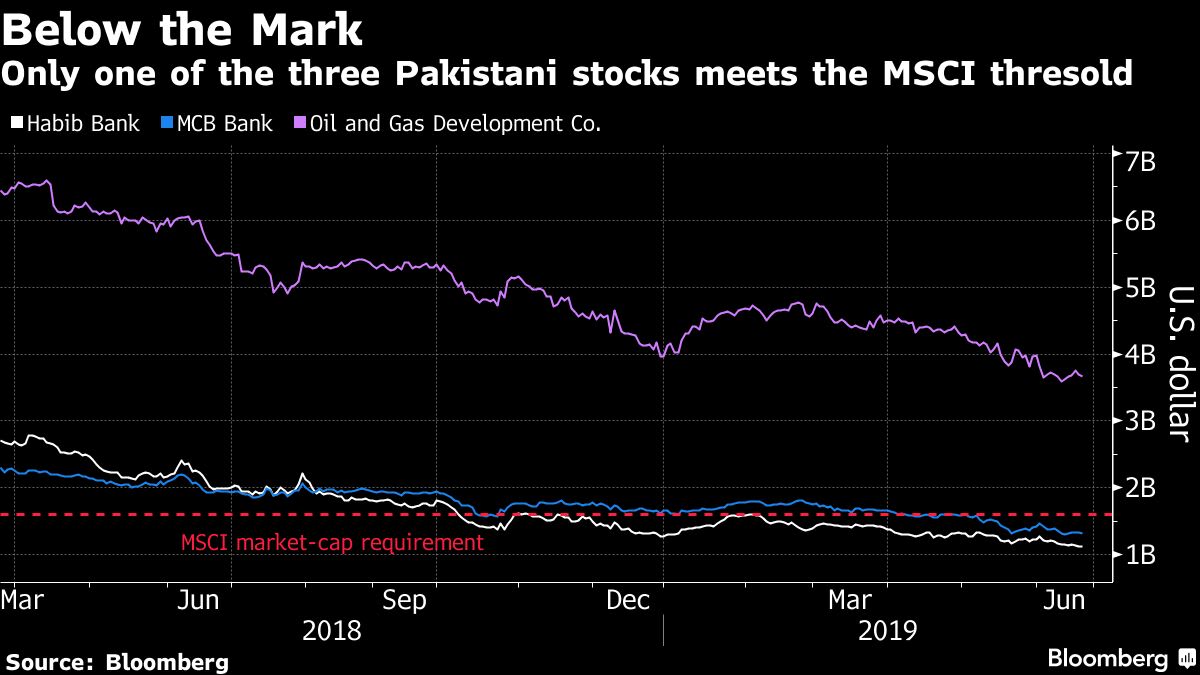
(Bloomberg) -- Equity traders are usually disappointed when MSCI Inc. downgrades a country’s index status. With Pakistan, they are upset it didn’t.
Investors had expected the index provider to start talks on downgrading the country after it failed to meet the minimum market-size threshold to maintain the emerging-market status. But the New York-based company left out any mention of Pakistan in its annual-review statement earlier this week. The nation’s equity benchmark has declined for four straight days, on course for the biggest monthly loss this year.
While the omission is consistent with MSCI’s policy to give under-performing markets time to rebound above technical thresholds, traders worry that Pakistan’s presence in the emerging-market group is starving it of foreign-fund flows given its tiny weight. A shift to the frontier gauge may give it a sizable presence in that segment and help it lure fund allocations.
“One ray of immediate hope was Pakistan gets a downgrade leading to a higher weight in FM,” said Gohar Rasool, the head of international sales at Intermarket Securities Ltd. in Karachi. “Local investors see a downgrade as a possible trigger for foreign inflows and would play along and join the bandwagon.”
Of the three Pakistan-listed stocks in the MSCI Emerging Markets Index, two have fallen below the minimum market-size requirement, dragging the nation’s weight in the gauge to 3 basis points. If global money managers divided their attention and time by the weight each country got in the index, they would have to spend only 47 minutes a year on Pakistan, Renaissance Capital said earlier this year.
Fixing The Economy
Now that MSCI has belied investors’ expectations, they must look to other clues to gauge the equity outlook.
Prime Minister Imran Khan’s government has resolved to narrow the current-account deficit after an economic crisis forced the nation to accept a $6 billion bailout by the International Monetary Fund.
“What matters for Pakistan is more the cycle and economic reforms and what happens with the IMF,” Mohamad Al Hajj, an equities strategist at EFG-Hermes in Dubai, said by phone. “That’s what is going to drive market returns.”
An economic turnaround by Pakistan may take time, but there’s an immediate incentive for equity buyers. The government has approved a fund to buy stocks through a state-owned asset management company. A similar vehicle had been behind the resurgence of equities after the 2008 financial crisis.
Traders’ disappointment over the lack of an MSCI downgrade may seem odd, but it has a lot to do with Pakistan’s economic woes and the shallowness of its capital markets. The nation has to prove itself worthy of its rank or relegate itself to a group where it can be a heavyweight.
“While other markets (such as Bangladesh, Vietnam) are working toward achieving emerging-market status, Pakistan’s government seems to be taking it for granted,” said Shamoon Tariq, vice chief investment officer at Stockholm-based Tundra Fonder AB in Karachi. “We would really like some concrete steps from the government for market development.”
(Adds stock index performance in second paragraph.)
To contact the reporters on this story: Srinivasan Sivabalan in London at ssivabalan@bloomberg.net;Faseeh Mangi in Karachi at fmangi@bloomberg.net
To contact the editors responsible for this story: Dana El Baltaji at delbaltaji@bloomberg.net, Anto Antony, Ravil Shirodkar
For more articles like this, please visit us at bloomberg.com
©2019 Bloomberg L.P.